Understanding Google My Business & Local Search
Google Maps Report a Problem: Does It Work For Local Spam?
Google’s crowd sourced map building and listing has succeeded on a number of fronts at allowing maps and listings to be updated at a pace that no one else in the industry can keep up. While the mapping side has little economic incentive for cheating, the listing side is prime for self serving activities. For some period of time there has been an asymmetry in that it seems that it has been easier for the crowd to create spam than for the crowd to get rid of it.
Dan Austin has been active in the MapMaker community for a long time. He has, over the past few years focused on reporting and trying to remove spam from the system particularly in the Locksmith arena. Here is a case study on his recent experiences with the “Report a Problem” feature; Google’s primary spam reporting mechanism.
************************************************
After Bryan Seely released the exploits he used to add false and misleading (spammy) listings to Google Maps on Mike’s blog as well as on Valleywag, Google went into full PR damage control and made some changes in how they handle local spam, including ending phone call PIN code verification for new businesses on Places. After reading this statement from Google, I decided to test whether or not the new Maps Report a problem is effective for removing spam:
We work hard to remove listings that are reported to violate our policies as quickly as possible, and to check bad actors that try to game the system by altering business descriptions once they are live on Google Maps. We encourage users to let us know when they see something that might violate our guidelines by using our “Report a problem” tool, found at the bottom right corner of the map. Everyday there are thousands of great edits that get made to Google Maps through Map Maker.
The problem with Report a problem is that historically it hasn’t worked very well for spam, in my three years using it to report hundreds of spam listings. Either the response was too slow (often months), and/or unsatisfactory (i.e the spam remained on Maps). My success rate with Report a problem (reporting a wide variety of spam points of interest (POI), including locksmiths), has hovered around 5%, which is why I switched to more effective takedown mechanisms like Google Map Maker (MM) in order to remove spam. Unfortunately, MM itself has become more problematic, with the introduction of GLEs (Google Listing Editors from Places), who are now reviewing edits to claimed listings. They have systematically degraded the effectiveness of MM to the point that it’s now impossible to remove many spam POIs, no matter how obvious, as they have been denying almost all edits (including spam removals) to claimed POIs, or closing the spammy POIs instead of removing them (a business that doesn’t exist can’t, by its very nature, be closed).
Moreover, after Places segregated Service Area Businesses (SAB) that hid their address from MM, many spammy POIs disappeared from MM altogether, making those impossible to report as well. It also broke the reporting mechanisms on Google+Local Edit detailsfor SABs, which uses MM to report edits (and the Classic Maps Report a problem, which also used MM). Here’s an example of a spam SAB with the address hidden that can’t be reported in either Google+Local or MM:
Aron Locksmith: https://plus.google.com/103220027599977382429
Fake reviews from spam profiles: 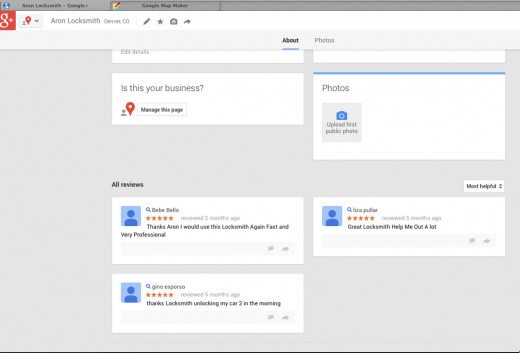
Clicking on Edit details leads to this error page (which is the same for all SABs on Google+Local that hide their address):
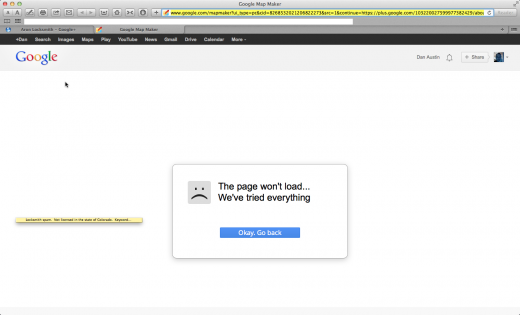
The reporting mechanisms on Google+Local for SABs have remained broken for many months now. Google has shown no inclination to fix it. Arguably the simplest solution to make it work again is to return SABs to MM (making the address visible inside MM) and continue to hide the address on Places, in order to allow crowdsourcing to verify business listings, since this was the state before SABs were hidden, and it was very effective at identifying and removing spam POIs. Business addresses are a matter of public record, and since Google doesn’t verify the actual business address except by sending a PIN card to that address (which is presently easily bypassed by filing a change-of-address at the local Post Office, or paying someone to receive the card and message the PIN code to the spammer), it will allow anyone to verify the listings for themselves and report and remove them, which is the intent of these reporting mechanisms. Moreover, the original reason for hiding SABs was to prevent people from showing up at the business location (often a private home) if the business only came to customers.
Since volunteer mappers frequently focus on not only their specific geographic area, but the type of edits they do, they’re much more effective and efficient at removing spam POIs than either Google’s own workforce or the general public, since they become progressively more efficient at doing so, and can often remove spam listings in bulk, greatly improving the quality of Maps listings. Provided that there’s effective oversight on Google’s end, this is a mutually beneficial relationship for both Google and the prospective spam fighter (often a local business looking to even the odds). Increasing the confidence in the reporting mechanisms will enable more people to actively participate in crowdsourcing verification.
I should point out that Google Places no longer appears to be actively enforcing hiding addresses for SABs, and many spammers ignore it anyway, since they’re focused on micro-targeting for local searches, building up a dense network of false listings in a large geo area in the hope that both Google’s algorithms as well as the searcher will choose the nearest listing rather than the most legitimate (it’s impossible for a legitimate mobile listing that follows the rules and hides the address for their one listing to compete with a spammer who puts up a multitude of listings in the same area).
After confronting the somewhat confusing and oversimplified interface for Report a problem, (here’s an alternate pathway), I reported a series of five spam POIs in the Denver, Colorado area, which was the subject of much discussion on the Google Places for Business forum leading up to the media revelations: 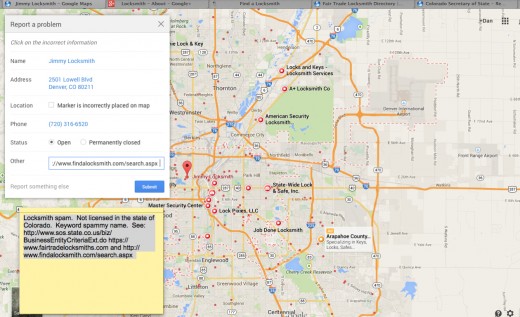
This is the note I added to all reports, in the Other, Notes field (I left everything else untouched):
Locksmith spam. Not licensed in the state of Colorado. Keyword spammy name. See: http://www.sos.state.co.us/biz/BusinessEntityCriteriaExt.do https://www.fairtradelocksmiths.com and http://www.findalocksmith.com/search.aspx
In order to verify the business listings, I used three authoritative databases, which I’ve organized into this verification spreadsheet for the whole of the United States (and parts of Canada), sorted by state and other factors (although geared toward locksmiths, it’s suitable for verifying almost any type of business, and is a good starting point. For example, lawyers can be easily verified by state bar association websites, contractors with state contracting licensing websites, bail bonds with bail bonds licensing websites, etc. Each type of commonly spammed category usually has its own database that can be found through a simple Google search.) It took me less than 30 seconds to check all three databases for each listing.
1. http://www.sos.state.co.us/biz/BusinessEntityCriteriaExt.do (State licensing)
2. https://www.fairtradelocksmiths.com (Free to use and register directory of all locksmiths in the US, run by Mark Baldino of Baldino’s Lock & Key)
3. http://www.findalocksmith.com/search.aspx (ALOA sponsored database of registered locksmiths)
I use a two-step process to verify spammy business listings:
1) Check business name:
- Does it comply with Google Places Quality Guidelines?
- Is it a real business name (that includes DBAs (doing business as))?
2) Check business address:
- Does it comply with Google Places Quality Guidelines?
- Is the business address real?
- Does the business address belong to the business in question?
- Is the business co-located with another, implausible business entity (i.e. locksmith at 7-11)?
- Is it occupied by another unrelated business?
- Is it a virtual office or private mailbox (which can be usually done through a reverse search of the address or visually inspecting the map to see if the business is sharing the same suite number with multiple other entities at the same location).
- If a shop, is it visible on street view or satellite view?
Depending on the kind of business, I might also call the neighboring businesses or local licensing authorities to verify their existence rather than the business itself. (Google’s preferred means of verification is calling the business in question, which is ineffective, since the spammers have already been trained to deal with Google’s call asking whether they’re spam or not.) I also have specific verification processes for different kinds of spam–I might investigate when and how they were created, and even what type of business model it is. (By way of example, locksmiths have different patterns of spamming than lawyers.)
At the time I used Report a problem (March 2, 2014) this was the total number of locksmiths in the Denver, CO: 674 results. Realistically, there’s less than 20 legitimate locksmiths in the whole Denver metro region. I chose five at random. After the first two pages, it’s almost all spam anyway: 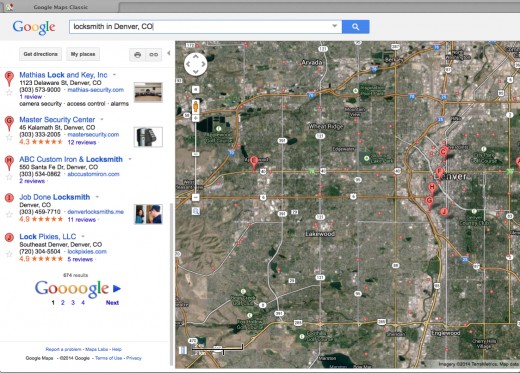
These are the five listings I reported on the same day, with various screenshots verifying the listings:
LAZ Locksmith: https://plus.google.com/109987688942743754291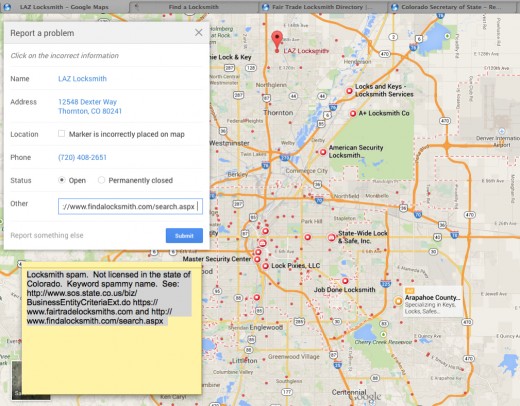
LAZ Locksmith was in the middle of a lake: 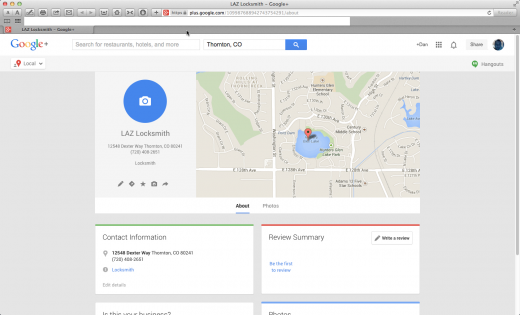
Expert Denver Locksmith: https://plus.google.com/110504812142952822533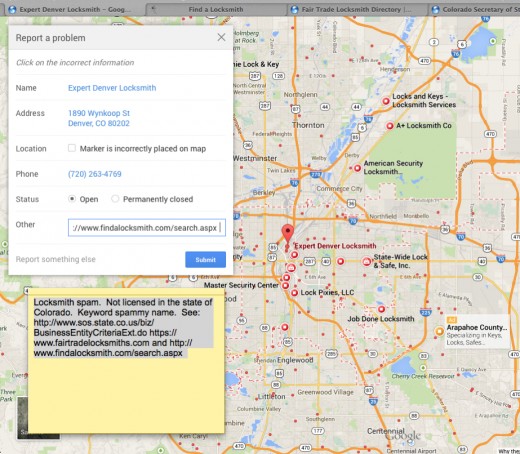
Arvada Locksmith: https://plus.google.com/113455288867033294546
Locksmith of Denver: https://plus.google.com/102381619064268592406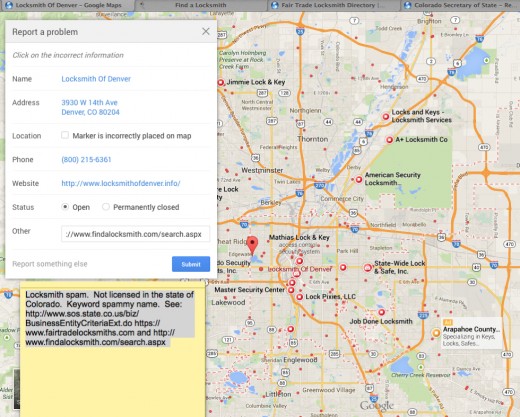
Jimmy Locksmith: https://plus.google.com/111157112611709506482
During the time I reported them, Google suspended the email reports that normally accompany reports, namely:
1) Report received, which can take 24 to 72 hours to show up (which is much slower than it used to arrive in my inbox).
2) Action taken, which can take months to never to show up.
I haven’t received an Action Taken email in over six months. The last set of Action Taken emails was over the summer of 2013, when I received a large batch (over 100+) of Action Taken emails in the span of a few days while Google was clearing out a backlog of reports. No actual action was taken on any of them (I verified by clicking through the Maps link embedded in each one).
Without the normal email notification, it makes it impossible to confirm whether Google received this set of reports at all, or whether my reports had anything to do with the removal of the spam POIs. For all I know, Google may have completely suspended Report a problem while they cleared out another backlog of spam reports, and the spam POIs that I reported had been reported many times before (as is often the case). Or they may have been hyper-responsive to any incoming spam reports while they waited for the media response to die down, hoping that if they immediately acted on a report, they could prevent the media story from escalating and going viral.
Prior to the introduction of the new Maps, Report a problem fed directly into MM, enabling you to track reports as they moved through the system, as they were attached to your MM profile. Google made the decision to isolate the new Maps Report a problem mechanism from MM, so with the exception of the two emails and checking the Local URL periodically, there’s no way to track the progress of your reports. You can’t see who reviewed it, and you can’t appeal their review, unlike in MM, which has mechanisms that allow you to do so.
I gave Google one week to process the reports. These are spam reports, so it should take them no more than one minute to verify each spam listing, and they should have a sufficient workforce, based on the average volume of reports, to manage the incoming reports and process them quickly. I also based my week long estimate on the average response time to Map Maker spam reports and deletions, which take, on average 72 hours (three days) to respond to either edits or reports.
I should point out that the response time from MM reports (which is a separate process) have gotten much longer, mostly due to the fact that MM Google Reviewers now have to go back over the reviews of their counterparts at Places, the previously mentioned GLEs (Google Listing Editors), who have been making an unusually high number of poor reviews in Map Maker, creating twice the work at twice the cost.
Google removed all of the spam POIs within one week, with the exception of Jimmy Locksmith.
I re-reported Jimmy Locksmith on March 11, 2014, and received a Report received email, which indicates Google turned the email reporting system back on: 
They still have not taken Jimmy Locksmith down. As of this posting, it remains active, despite clearly being spam.
From my observation of this process, I’ve concluded that Report a problem has gone back to not working again, and that my initial successful reports were an anomaly. Although four out of five were successfully removed, I can’t definitively attribute it to Report a problem. There are multiple reporting avenues, including Map Maker, and active spam fighters in the Denver region who are reporting and removing spam, so it’s just as likely that someone else reported and removed it via MM (or Google removed it internally in a spam sweep unrelated to my reports). It’s unfortunate that Report a problem isn’t working, as Google has little interest in managing the local spam problem beyond modest damage control, and although the spammers can no longer verify their spam POIs via phone, they can certainly use the mail to add new listings through Places, like Royal Lockout Service: 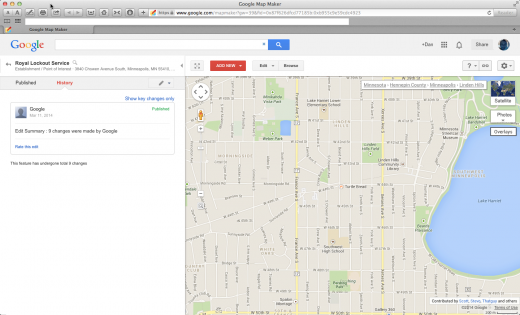
As a DIY kind of service, it’s the end user who is forced to report the spam that Google initially approved. There’s no reason Google can’t make the reporting mechanisms more effective, faster, efficient and transparent. As I’ve shown repeatedly through my own efforts, it’s easy to find and verify spam listings, it’s quite another to have them successfully and quickly removed.
Finally, I should point out that Google had promised four years ago (the actual video dates from May 6, 2010) to fix the verification problem, which will improve both their response to spam reports as well as reduce the amount of spam still being added to Maps, and since then, they’ve done little about it other than appease the occasional media critics with self serving PR statements, even when confronted multiple times in the interim.
Ultimately, if Maps Report a problem doesn’t work for you, you can use the following resources to report scammy listings or ads, since spammers have often committed a wide range of state and federal crimes:
|
Agency |
Issue |
Contact Form |
|
IRS |
Tax fraud |
|
|
Postal Inspection Service (PIS) |
Mail fraud |
https://postalinspectors.uspis.gov/contactus/filecomplaint.aspx |
|
FTC |
Consumer fraud |
|
|
FBI |
Cyber crime |
|
|
ICE (DHS) |
Immigration fraud |
|
|
State AG |
Consumer fraud |
|
|
State Revenue |
Tax fraud |
What has your recent and past experience been with Maps Report a problem or other reporting mechanisms?
Do you have any examples of spam listings that you’ve reported repeatedly and haven’t been taken down?
What do you think Google needs to improve to make the process of verifying listings and removing spam better and more efficient?
Have you ever needed to bypass the Google bureaucracy and if so, what did you have to do to get spam taken down?
Have you ever felt compelled to spam just to compete with the spammers?
What’s do you think of Google Places phone and postcard verification methods?
What’s your spam story?
Please discuss in the comments below. I can answer any questions you might have.
© Copyright 2025 - MIKE BLUMENTHAL, ALL RIGHT RESERVED.
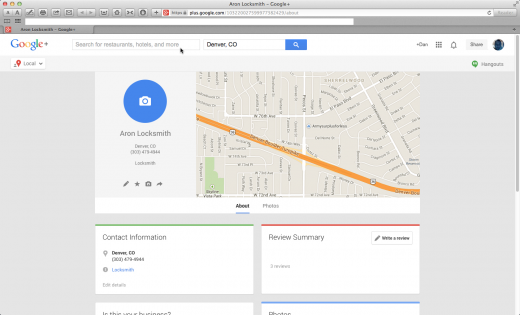
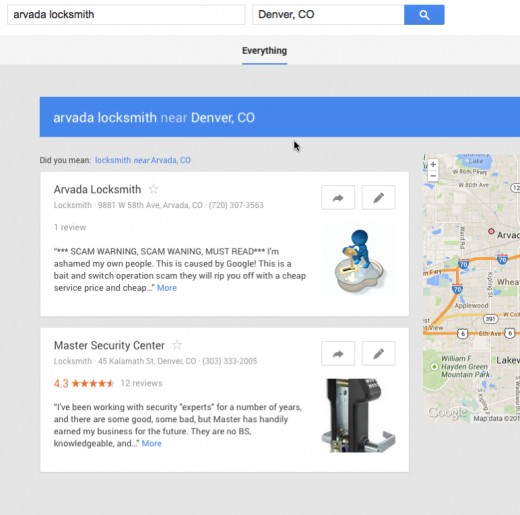
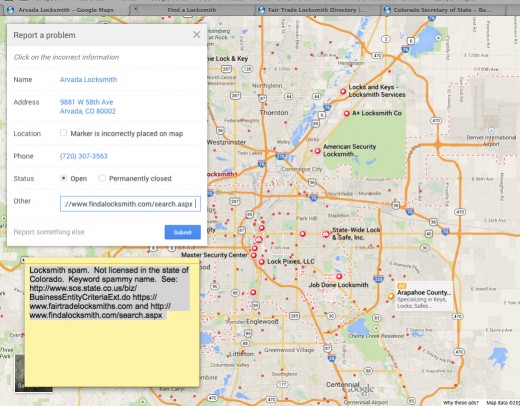
Comments
41 Comments
Fantastic post, Dan.
My semi-recent experience with “Report a problem” is – surprise surprise – that it’s about as useful as a jacket in Hell.
I’ve flagged this guy several times:
https://plus.google.com/110826884351610439365/about
You can see the UPS store from Street View.
I remember Google pulled one totally obvious listing a year ago – but only because I mentioned it to an RER.
Thanks for a great read.
@Phil:
Thanks for that. I was hoping that Google would finally take the media revelations to heart and make some significant changes. Guess not.
In 2012, I made specific recommendations to Mark Ewing of the Local Data Quality team to change how they review reports, and how to verify listings (including the 2-factor authentication mentioned above), and I also mentioned multiple times how difficult it was for most spam reports to pass through Report a problem successfully. Unfortunately, instead of making an effort to fix things, he ignored my recommendations, and continued on the same disastrous course that they’ve charted up today. They apparently have people looking at these reports, but judging by the effectiveness of the GLEs (Google Listing Editors) on MM, who are probably also reviewing the reports for Maps, almost all the spam reports are denied or left to languish.
One of the recommendations I made was simply creating a database of all the UPS and Post Offices in the US, along with Regus and other virtual office providers, and flagging listings if they use those addresses. Google could even simplify it so that they flag any business that shares a location with a virtual office or mailing service category, but I’m guessing they don’t want to do that because it would create not only false positives but a lot of extra manual labor reviewing all that spam. More money for Google Glasses and robots, I suppose.
Sadly, the business you reported could have hidden his street address, and you would be none the wiser. Google regularly approves a lot of POIs with virtual offices and private mailboxes, and so long as they get a PIN card, they don’t care. Since you can’t see the SAB in MM, you have one less opportunity to fact check yourself.
Regus, one of the biggest virtual office providers, offers mail forwarding (http://www.regus.com/products/virtual-offices/mail-handling.aspx), so a spammer could set up a virtual office for a one-time fee and have the PIN card sent to their actual location. If they hide the address, how would anyone even know they’re using a virtual office?
If you can’t use Report a problem successfully, why have it at all? If guidelines aren’t enforced, why have guidelines?
Great post Dan!
I’ve also run into several instances where fully legitimate edits on MM have been rejected or where my edits or my caveats against keeping a duplicate listing have been completely ignored. Meh!
Can only get better, can it?
Greetings
Nico
Great post Dan! I learned a lot of new stuff. I’m wondering why Google changed it so that RAP through the new maps doesn’t feed into MapMaker. Seems more disorganized and confusing.
I’ve struck out many times reporting spam as well – it seems like complete hit or miss with absolutely no consistency.
Thanks Mike, this post appears to have quite a bit of work behind it. Your tireless efforts do not go unnoticed
What has your recent and past experience been with Maps Report a problem or other reporting mechanisms?
—> I’ve had about 60% success reporting spam listing in MM, it seems like I either get someone who knows what they are doing, or I get a completely mindless ‘decline’ (are these declines by a machine?).
What do you think Google needs to improve to make the process of verifying listings and removing spam better and more efficient?
—> It may not be feasible, but I think the G+ Local Business Page Support reps I have spoken with have all been very bright and understanding. If they were the ones to deal with spam reports, we’d have a lot less spam.
What’s do you think of Google Places phone and postcard verification methods?
—> I can’t think of a better method that could be scaled, and wouldn’t be too much hassle for SMB’s; there’s always likely ways for someone to spam.
Whoops – sorry Dan Both of you work hard to help the Local community
Both of you work hard to help the Local community 
Thank you for the detailed article.
One of my biggest clients is a local franchise locksmith company . They are licensed and professional. For the last year ,many of the local franchise listings were of the map marked as spam for no good reason. It has been devastating and had financial impact on the business.
My 2 cents:
1. The impact of being on the map is so high and can mean life or death for a business. I am sure business owners (my clients would) will be happy to pay Google for a more standard process of validation. For example, allow businesses to submit their business license and/or other legal documents that will allow them to proof their validity without going through tips, tricks and support forums.
2. Some of my clients are “mobile” and their business address is really not important. Just for example, a small plumbing guy works basically from his car. What do you expect him to do?
While he not using UPS address I can not see why Google should focus on flagging businesses that are using UPS or similar. It means very little to the quality or legality of the business itself.
@Nico: Google reminds me a bit of the donkey chasing the carrot. It’s always out of reach. Poor donkey.
Some mappers on MM have had their longtime accounts frozen by recent changes in moderation. Many mappers have had their accounts marked as spam for removing spam. I’ve all but stopped editing on MM because of the fear that every edit I’m making will be denied for a trivial reason or no reason at all. Not even unclaimed listings can escape the wrath of being “GLEd” (Google Listing Editor denied). Moderation is as stupid as ever on MM–I feel your pain.
@Joy: The Goog likes change, even if the change makes no sense.
More importantly, deprecating a feature in favor of hiding a process that is already ineffective, inefficient, and opaque doesn’t exactly inspire more trust in Report a problem. If anything, if I can’t see the sausage being processed as I did before, I can’t really know what they’re doing to the meat.
@Andy: I think the declines are coming exclusively from the Places GLEs. I’ve had about 0% success with spam deletions on MM with GLEs, and about 95% success with the same type of deletions but with MM GRs. Two completely different groups, two completely different methodologies, even two completely different toolsets. The MM Google Reviewers are usually pretty thorough, and they check a lot more ‘resources’ (Google it, Street View) than their Places counterparts, who may as well be bots for all the work they put into hitting the Deny button. In point of fact, I had a little hand in training the MM GRs, so they know what to look for and what additional resources they can check. Plus they deal with so much spam coming from India that it’s practically second nature for them to identify and remove it.
Google has had a lot of trouble with GLEs, but they don’t seem very inclined to train them to do their job better. I wonder why? No iteration for GLEs?
Apology accepted! Mike opened up his blog so that I could post to a wider audience than the MM forums, so I’m appreciative of that.
@Michelle:
1. Facebook requires you to upload some sort of business documentation. Google doesn’t seem to be to big on copying Facebook. Why not? It would certainly expedite how they handle this process, and give them a clue as to what to look for when they verify it against state databases, which have some pretty sad search engines straight out of the 80’s.
For locksmiths, Mark Baldino has already created a pathway via Fair Trade Locksmith. It won’t cost legit locksmiths a cent, and it’s the seal of approval that I think everyone is looking for.
Oh, and it’s pretty quick and thorough. Google hired a firm after their $500 million fine for their Canadian AdWords scandal to vet pharmas. Not sure why they can’t do the same for locksmiths. Must be all the Adwords revenue from spammers like Run Local that is distracting their attention.
2. I’m ambivalent about this. On one hand, I can see the necessity of private mailboxes, especially when it comes to separating home from business for tax purposes. On the other, it makes it more difficult to verify a business, and spammers tend to exploit these kind of situations to the Nth degree, as private mailboxes (and virtual offices) are everywhere, enabling them to extend out their spam network quickly and cheaply. Private homes can be abused too, and so can business offices.
Regardless, I don’t trust Google or their verification process–they have none. I just want to see some level of transparency for the biz address in some Geo product so that I can verify it myself, even if it’s a private mailbox. There has to be some tie between the physical address and a business registration and tax record. The closer spammers get to the IRS, the better. LOL.
Dan:
This locksmith spam has been occurring for a long time. Per Mike’s blog I see he reported it here back in Feb 2009. This article is from Feb 2008 although its sourced back to 2006. http://thehollytree.blogspot.com/2008/02/scam-alert-phony-israeli-owned.html
Per Mike’s article from Feb 2009 the G Maps view of locksmiths in Manhattan looked like the Map had an acute case of the measles. Very outrageous.
Per your comments above, you found 674 locksmith results in G Maps and you suspect not more than 20 actual locksmiths.
Years ago I used to lease office buildings and we needed a steady locksmith vendor. Tenants would move in and out and we had to have the locks changed.
Hey, you are correct…there are not hundreds of locksmiths in a major metro area. There are a few. We would periodically contact them to get bids for services.
I searched on locksmiths in Denver. I used google.com and google maps and went to the traditional version with a list of businesses on the left side of the screen.
First thing I noticed are some adwords ads for locksmiths with enticing $/price offers and 24/7 service. I’d check those. Are they real or not? Frankly google is making direct money off of them.
Google knows that not all locksmiths are REAL. The issue is years and years old. Is it taking money off of fake businesses or not? Is it contributing to spamming consumers?
If I wanted to highlight this again, I think I would go to some consumer reporters; possibly tv reporters and/or local hyper local media and see if I could find consumers who were spammed/ripped off. I’d want real stories of real spammers.
I’d want to highlight the theft. Other than that its a low level/low visibility type of crime.
Finally with regard to denver locksmiths I looked at the reviews from this guy on his google plus page: https://plus.google.com/112827481444627026828/reviews?gl=US&hl=en-US
A stunning array of attack reviews on a good number of locksmiths; I saw two of these folks.
If google were really thinking about user experience…they would have tackled these issues years ago. seriously the locksmith spam issue has been around roughly as long as there has been google maps. So we are speaking about 8 years since google integrated maps views into google.com.
If they were concerned about not facilitating crime, they may do a double check on the ads they are running. Are those locksmiths ripping people off? Is google accommodating this? In fact, since google is the monopoly search engine are they partnering with the creepy rip off locksmiths?
BTW: A couple of weeks ago I looked at locksmiths in my area, and called you. You were nice enough to provide your methodology outlined above.
If you can do it, why can’t google. They are big!!!! $60 billion big. I do hope they haven’t gotten to be $60 billion big by helping locksmiths continue to rip off people.
@Dave. Thanks. Good to talk with ya!
I actually think there’s about 10, but I’m being generous. I haven’t checked the list I had in a while. Statistically, there’s about 5000 locksmiths total in the US, and that number is declining with retirements, technology, the economy, and the spammers.
The biggest untouched angle to this story is AdWords. All the locksmith ads on Google are scammers. Not one legit locksmith I know is willing to compete against the spammers–they can’t afford to kick $20 up to Google, and they can’t afford the onslaught of click fraud bots either. I suggested to PM Mark Ewing at LDQ that Google alter their AdWords policy and remove any numbers, specifically no more “$15 unlock in 15 min.” and instead replace it with “Cheap unlock fast”. Seems fair to both the spammers and Google, right? Nope. Google won’t budge. To quote several Google Geo reps, “It’s a different division from Geo” implying it was completely out of their hands. Srlsy? So why did Google cancel Run Local Locksmiths’ AdWords accounts last year? Google really put the hurt on Run Local, and Run Local is the biggest, baddest spammer of them all. Google silenced Run Local, and for good reason–Run Local attracts a lot of bad press. But what about the rest? The other spammers are equally repellant. It’s all bait and switch, and the Goog is getting their taste of the blood money. If you get ripped off by a scammer, do you want to kickback money to Google?
Whoa, another great post Dan! I’m glad Google is starting to lock new listing verification down a little tighter, but I agree a lot of work still needs to be done to improve RAP so we can get existing spam cleaned up that we find.
I had not seen your “Wiping Out Spam” article until now Dan, so thanks, that’s really helpful as well.
As a test to see how fast spam was being taken down, I reported a Chiropractor in Sept that had like 12 duplicate listings for the same location, most with fake KW string stuffed names. Then we discussed on my forum maybe 2 months ago and a couple of my members reported too. I think a few of the worst KW stuffed dupes are gone now, but there are still 8 listings that practice, which is a violation and some are still KW stuffed names like “Austin, Herniated Disc Therapy at Texas Spine and Sports Therapy Center”. Plus there is anther KW stuffed listing for the same practice at another number.
When I do spam reports I even explain that I’m a TC, which does not appear to help.
It seems like Google could give folks like Dan and Top Contributors and RERs a special spam fighting door to go in or mark our edits as priority and trusted. (They could still eval them, but they could have a green flag and go to the top of the list.)
Seems like if they have volunteers like us, who work for them for free anyway, they would give us the means help them more efficiently.
Instead, I’m frustrated and have given up trying to help fight spam. It’s just not worth my time if my edits seldom go through.
@Cathie: How hard is it to review and change a bad telephone number? Guess it’s too hard for Google to Google it!
@Linda: Well, at least I know where to get my back cracked!
The sad thing is that the volunteers on MM are better at their non-paying “jobs” than some paid Googlers are at doing theirs.
We have a lot of crazy people who are willing to devote hours and hours to fixing Maps, and Google’s upper management is just not interested in supporting them. Google has systematically degraded their crowdsourcing Geo mechanisms to the point that a lot of die hard mappers and spam fighters have given up.
I have a set of mega spam that I tried to shuffle through the review process that is now pending on two months, with no end in sight. It’s really unfortunate, and the spam is so dense in this business vertical that it’s trending about 70% spam (not locksmith, but an almost equally spammy category).
Here’s a good example of a spam SAB that has the same name as a legitimate locksmith shop, and that Google has not taken down, despite being reported as spam:
https://plus.google.com/114631596786687586462/about?gl=US&hl=en-US
This is the real Broadway Locksmith (visible on street view, licensed, etc.):
https://plus.google.com/115970462267139310482/about
How did Google verify the spam POI?
How do you remove it if it’s already been reported and Google hasn’t taken any action?
How does anyone know if this a legit business address if the address is hidden?
Why is the Edit Details link not fixed?
From this forum post: https://productforums.google.com/d/msg/map-maker/UL1Y5CEdUJA/-9D0rP4fmqgJ
I should also point out that the original, authentic Broadway Locksmith has had tons of problems over the years (through no fault of their own) with their listing because of Google’s bugs. Fax no. appearing instead of their main number, the listing disappearing for no reason at all or being taken down because it’s “spam” (even though you can clearly see it on street view).
This isn’t just a spam issue, it’s that regular locksmiths have to content with the double whammy of spam and Places bugs.
We see the same issues for all general contractors, not just locksmiths, but plumbers, roofers, electricians, etc. The UPS store must be a go-to tactic because we’ve reported several plumbing locations using a UPS store in a small town. We reported it from multiple accounts, cities, ip addresses, etc. and NOTHING has happened. Its been 2 years!
I fear another issue will arise soon; many legitimate contractors like locksmiths will start following the same tactics. I’ve already been asked about it several times only to reason the client out of it. However, one cannot deny that the spam is working (generating leads) on some level.
Thanks Dan, your a gem
*you mentioned: Many mappers have had their accounts marked as spam for removing spam.
No more reports from Andy then… until this gets straightened out – how sad this all is.
@Andy: That’s true. Many mappers are having their accounts frozen. Although it’s only within MM (you can still use all the other Google services), it’s a issue with the new MM algorithms/locksmith spam sweep, and it’s created quite a problem for mappers who just want to map. In case your account is frozen for any reason, contact reportabuse-mapmaker@google.com with your MM profile, and ask them to unlock it. If your account is in good standing (i.e. you’re not a spammer), they should unlock it in 24-72 hours during the weekday. You can also escalate to the forums if that avenue is not working.
@Aaron: Hate to say it, but some legit locksmiths are already considering that route, if they haven’t gone down that road already. It doesn’t pay not to cheat. There’s really little penalty, either. The spam team has in some cases taken down the same spam network with the same name multiple times (like Lock and Tech USA).
I used to be able to say, “Head to Map Maker. They’ll clean up what Places ignores.” Sadly, that’s no longer the case. It’s just gotten too complicated contending with bots, algorithms, GLEs, SABs, bugs, etc. I also think that MM is basically taking up all the slack that Places isn’t willing to devote resources toward, which further strains the ability of MM to add good data to Maps rather than devoting a lot of resources to dealing with spam.
Bryan Seely, the “spammer” (https://twitter.com/maptivists) recently reported that Places is 3-4 years behind on reports, so you’re only a year or two away from getting a response. It’s also interesting that Maps has isolated Report a problem from MM, so you can no longer see the backlog, or how they’re choosing to respond to it (which in your case, is to not respond to it at all).
Just reported a business under local seo tampa: https://www.google.com/#q=local+seo+tampa
Apparently fake looking reviews, stock images and the like.
Let’s see what happens using the Report Problem tool. I will continue to check and keep you all updated.
@Ed: Thanks!
I reported another set of five over a week ago, and no action has been taken. I ran them against a state locksmith license database, so they should be quick to verify and takedown.
Looking forward to your updates.
Dan: The entire locksmith issue is widespread on google. Its also pervasive in a variety of other media, including bing, and yahoo, web directories and hard book yellow pages.
I looked at this reddit TIL (things I learned) from a while ago.
Over 300 comments. The thread starter described the locksmith fraud effort, his unwillingness to pay, the fact that he got his spare key and opened the car himself, the fact that the guy in the truck returned with no money….and the fact that he kept telling the dispatcher who kept calling him he paid the tech.
Ha ha. He had to have the dispatcher –the company, and the tech all blaming and attacking one another.
Beyond that, there is at least one comment from a former phone dispatcher who revealed that all the phone numbers for all the fakes go to one central service. There are other comments from people who got ripped off.
There is also a comment from somebody who wrote that they worked on the google project to try and fight locksmith spammers.
hm…..whatever they worked on a while ago….they seem to have reached a level and STOPPED.
If one searches for locksmith fraud one can find a long long list of stories from the news, reports on police actions, etc……all that detail the widespread fraud by locksmiths.
Its low level under the radar crime. It often doesn’t get reported. The reddit story reveals that. People got ripped off and never reported it.
Google has worked on the issue. You are aware of that. They have evidently stopped caring.
Meanwhile spammy locksmith sites are pervasive in organic google results for every city and town, and they are pervasive in adwords.
The adwords issue really stuns me. Here is a topic that google obviously knows is full of fraud, has worked on the issue, has dealt with it with police authorities….and yet it prominently places adwords ads for spammy rip off locksmith sites all over its web results.
Remember google is the 80% monopoly on search. If one locks oneself out of a car or house, the likeliest source of getting the phone number for a locksmith is search on a mobile.
On my mobile I looked up emergency locksmith.
First I see two ads. I know they are fake locksmiths. Then the first thing in organic in my area was a yelp listing. I like that in this case. Where I’m located I see an organic listing for Baldino’s. Hallelujah!!!!!!! We know that is a real locksmith.
When I search on just the phrase locksmith google gives me local results with a map. Hopefully there are more real locksmiths than fakes in that pac. I didn’t check.
I’m stunned by the placement of the ads. Google 100% knows these are ads for spammy fraudulent locksmiths.
Jeez. Not only has google stopped trying to fight this problem…now google is openly taking their money, highlighting the spammy fraudulent ads on the top of the search page.
Its become a knowing accomplice to the widespread fraud. Its making money off of something its patently aware is ripping people off, and something it has openly addressed years ago if not now.
That is a very dirty turn.
@Dave:
If you search for Locksmith in Denver, CO on organic (http://goo.gl/FXn2FE), the top three AdWords results are $15 in 15 min., $19, and $19. The fine print on the websites is that the unlock will cost you far more, and that’s just the fee to come to you.
I think the pervasive attitude in the US of ‘Buyer beware’ is what keeps Google in the grey, and law enforcement has no interest in digging too deeply into this because of the slippery nature of the issue (money and people can disappear quite quickly, and good luck extraditing or seizing their assets). It has nothing to do with the hot button law enforcement priorities, like terrorism or drugs, and is a really boring issue that not many people are aware of (until they get ripped off).
Essentially, Google can say “We’re doing our job, they advertised their fee schedule on the website, it’s the responsibility of law enforcement to enforce the law and for people to check into this”. And they’re right! However, it begs the question of why they cancelled Run Local’s AdWords accounts if Run Local offered the same service ($15 in 15 min.) and if Google is unconcerned with the technicalities of the ads they offer, and why they offer guidelines on maps and AdWords that they only enforce half-heartedly and sporadically, often according to the degree of embarrassment they’re suffering in the media. And why would you offer services in your marketplace if you know that they’re doing something illegal?
Ethically, Google’s participation in this affair is really shady, and they seemed to have learned no lessons from the $500 million Canadian pharmacy scandal. Most importantly, the spammers are undermining the integrity of Maps by adding spammy listings through the easily bypassed “verification system”. It puts paid to the lie from the PR rep originally quoted in my post that Report a problem works to correct this issue. I think everyone knows by now it doesn’t. If a map is not accurate, then it may as well be one of those 5th century maps that has regions of the globe labeled as “Thar be dragons here!” And honestly, that would be a more accurate summation of the potential harm one faces if they use Maps to find locksmiths, carpet cleaners, or myriad other services that have taken over by spam.
Power tips, in the interim:
*Find a legit locksmith and add it to your contacts before you go. Less than 5 min. and you’re done.
*Call a tow truck service if you’re not sure. They have the same tools, and they charge much less (although they can be a shady bunch like the spammers, so be careful to get an estimate).
*Get AAA or add roadside service to your car insurance (it’s cheap).
*Hide a spare key in all the usual places.
*Investigate those fee schedules.
*If you pay, only pay what they gave you as an estimate. Don’t agree to anything more. Use a credit card so you can reverse the charges later.
*File a complaint if you think you’ve been ripped off.
Shameless promotion for a locksmith friend in the Denver, CO area:
Barry Oliel
(720) 588-9060
info@TheLockGuyz.com
http://thelockguyz.com
Denver, CO
Download his contact info.: https://db.tt/Iq0Od12s
He’s honest, ethical, well-trained, and licensed.
What a great post!
This jumped right off the screen at me:
“I should point out that Google Places no longer appears to be actively enforcing hiding addresses for SABs”
This seems like it deserves a post of its own. I’m incredibly curious about what you’ve noticed in regards to this.
@MiramEllis:
This is mostly speculative, based on my experience working with spam on both Maps and Map Maker. Although Google may catch up with you at some point, there was a drive by Google to hide addresses (complete with the requisite call and sudden disappearance of your listing), and now there isn’t. If you look at the locksmith spammers in the Denver, CO region, many of them are displaying their address even though nothing can be found on street view. This is part of the strategy of micro-targetting that I mentioned earlier, and SABs have long been unfairly penalized for not showing their address, particularly if they serve one market (say, Denver), but live in another (like Commerce City). The past strategy was to set up a UPS Store or virtual office in the market you want to be in an effort to elevate your listing in the search by proximity to the location of the person doing the search (which is increasingly mobile-based). Now you can just make up a fake address by finding a real unoccupied one (rental and for sales from real estate websites are favorites), and have a PIN card sent to that location, then file a charge-of-address form with the Post Office for the hundreds of listings you’ve just set up. Mail fraud! However, for a little bit of work, you have tons of new locations that you didn’t have to pay for, the address is visible so that it will appear in mobile searches and you, the poor customer, actually think that the location is real and that they’re “minutes” away from you! It doesn’t pay to hide your address.
If Google was actively enforcing the rule, then presumably all those spammy listings would be flagged and removed until they hide the address. Shouldn’t take more than a few seconds to pull up the listing on street view and confirm that there’s no there there.
However, this may be more speculative than anything, since many of these spam listings aren’t ever claimed, so Google may not even care because there’s no one to check the Dashboard box for them.
Further complicating the issue is the behavior of GLEs (Google Listing Editors from Places) on Map Maker, who are denying edits to claimed listings that shouldn’t even be on MM, because they’re SABs (and obviously so). On MM, you can remove SABs that haven’t hidden their address. Many attempts have been made by mappers to remove the spammy listings for that reason alone (we don’t have the tools to hide the address), and the GLEs have explicitly denied the removals, and then taken no further action to hide the address to ensure compliance with Google Places Quality Guidelines. You can check the GLEs actions by simply looking at the history of the POI or going to the Place page, and 100% of the time, the address is still visible.
So my conclusion is that whoever was the fire behind the SAB rule has basically given up. They buffaloed the legitimate business owners into doing it (“Rules are for those who follow the rules”) and the spammers just adapted. The only remnant of that crusade is the decision to keep SABs hidden from MM, and once Google has made a bad decision, they like to stick with it.
Dan,
Sincere thanks for your detailed and interesting reply! I’m aware of the history of the hide address rule, and so it was your comment about apparent lack of enforcement that totally caught my attention. Really fascinating to hear you speculate that Google may have given up. I thought it was a dumb rule in the first place and have written several things to that effect, but if Google is now seeing the light about the impossibility of enforcing this (and it really is verging on the impossible), then it would be great if they’d just rescind the whole thing and re-write that section of the guidelines.
Again, really appreciate the time you to to reply to my comment. Your understanding is impressive!
@MiriamEllis:
Thanks, Miram.
I would be careful attributing it to Google ‘seeing the light’, unless it’s a blinky lite leading to a Star Trekesque future. LOL. I’ve noticed that they tend to give up on their initiatives pretty easily (they have a graveyard of failed products), so it may be as much a lack of interest on following through as the impossibility of enforcing it. If it’s a privacy provision, Google should have emphasized that businesses can check that box as an option rather than something mandated from above, which was a huge waste of resources that could have been better apportioned to cleaning up bad data. Places is rife with a lot of decisions that are a reflection of Google’s boredom rather than a responsiveness to product requirements and/or demands or careful thinking about the impact that it will have on SMB owners.
As many things Google, there’s a tendency to impose their schemas on top of reality for whatever reason (sometimes because it fits their data requirements, sometimes because they want to experiment, sometimes because they’re enamored with a particular system like Zagat ratings instead of stars) and then realize at some point that it doesn’t really work that way, or a PM or VP leaves and the product group breathes a sigh of relief as they can finally abandon that bad idea. We can be thankful, no matter how it comes, that they’ve ‘seen the light’. LOL.
I’ve reported this guy for 3 months.
6 accounts all using different keywords for the company name and are all linked back to the same website.
https://maps.google.com/maps?q=prestigeexteriorpainting.com&oe=utf8&ie=UTF-8&ei=zKDVUrOjLYbJsQSzjoKQAQ&ved=0CAoQ_AUoAg
I’ve reported this google plus page several times (the page has fake reviews that inflate their rating improperly) and:
1. No action received email.
2. false reviews are still up (total of 9 in the last 2 weeks have gone up with 5 star reviews, each of those reviewers has minimal reviewing experience with many having only that single review).
Google needs to get it’s act together before people start realizing that their rating system on maps is inaccurate and not credible.
@jon the review reporting mechanism doesn’t have an email feedback component. That is just for business listings.
Reviews need to violate Google’s TOS to be taken down. Google doesn’t arbitrate truthfulness with reviews.
I was first under the impression that my account had been flagged by some of the spammers I was deleting, or a LE with a vendetta, but was somewhat comforted to know it wasn’t just me getting flat out denials with no reason (misery loves company).
One thing I found helpful is to follow this process:
1) Report the listing (record the date)
2) If it is denied, hit “I Object” and wait a month
3) After a month, make a post in MapMaker and try to get someones attention who can report it to the higher powers and push it through faster…
4) wait another few months….
5) wait 1 more month, they have to do something about it soon!
6) Have a beer, and forget about it
7) Notice one day that the listing has magically disappeared
I’m on month three of my escalation process, and three sheets to wind. There is hope.
Another article:
http://www.businessweek.com/articles/2014-03-28/how-scammers-turn-google-maps-into-fantasy-land#r=hp-ls
Hi Dan,
I am a locksmith in Thornton, CO and I just wanted to say thanks for all of you efforts to remove the spam around me. I saw the business week story first. All I can say is Keep Going, please! I’m not nearly as smart as you when it comes to map maker but I have tried to have obvious spam removed too. Some days are worse than others but lately I only do a call a day, if I’m lucky. I wish there were more people like you.
@Tom: Keep going! I put in hundreds of hours into MM so smart doesn’t have much to do with it, just keep plugging away to find solutions. Contact me with your MM profile and whatever email that you use to make edits. There’s something I can do for you to expedite some of the takedowns via Map Maker, especially with the current moderation mess.
Whoa, talk about going thermo-nuclear. Thank you. I have an issue with a local competitor / spammer using multiple non-real world names and keyword stuffed Google+ pages (http://goo.gl/uP4uQm) to illegitimately gain the top spots in Google search here locally for the queries “vehicle wraps charlotte nc” and “signs and banners charlotte nc”
I have given this company the benefit of the doubt and will not straight forwardly accuse them of spamming or “gaming” this known algorithm error/loop hole for those search terms, but who builds 4-5 keyword POI’s with the same NAP and DOESN’T know they are gaming the system?
If they did do this on purpose, I hope when Google finally fixes this they bury this company under a rock and it never sees the light of day again.
I am a locksmith, as were my father and grandfather and maybe my son too. Locksmith spam is ‘personal’ to me.You should trust me, and at one time you did – until the scammers moved in.
There are ways to get the spammers. If the address is hidden, (mine is, I work from home, but it is clearly visible on almost 140 different directories, people come by all time actually) you can find it easily.
From your PC search for a business (ie Locksmith Lawrenceville in my example) in the top right of search resultsis a little map, click on it and it will open up a large map with map markers for every listing fitting that description. Zoom in and it will show you the exact location. Even easier with a smart phone, search from your phone and click on a listing at the bottom a map appears, click it at the bottom of that is a blue circle with a right turn arrow in it,click that and it will guide you directly to the front door.
When you get there, snap a picture and use the “upload a public picture” feature, make sure to caption it “There is no locksmith at this location” or something like that.
Don’t be afraid to leave reviews, just be TRUTHFUL – ie there is no locksmith here it’s the Walmart etc.
I have found that when scammers get the bad reviews they just delete their listings, much quicker than waiting for Google. A legitimate locksmith will contact Google over a fake bad review and try to work it out. The scammer doesn’t care, he’ll just make another listing.
If they have the fake 5 star reviews, click on the reviewers and report them too.
As easy as it is to sit down with your laptop, I also encourage you to actually go by places and physically check them so you don’t accidentally knockout the good guys, we have plenty of problems with the scammers as it is. Happy Hunting!
One more comment for the computer sleuths.
A lot of spammer/scammers have websites, you can do an easy whois search here http://www.networksolutions.com/whois/index.jsp there are other sites too. If it isn’t registered by proxy, the registrants name, address etc will be displayed. Don’t get too excited, sometimes those are fake too. But you can legitimately report if the business address and the registrant address don’t match up. You can go one step further, do a Google search for example — Daniel Biran wesite registrant — this is an actual example I did 2 days ago, try it.
Little bits to make your reports to Google a little meatier. Or if you just want to notify your State’s AG about RICO violations, or the FTC about violations of the Fair Business Practices Act.
You can also take the phone number and ‘google’ it. See if it matches any other business names or locations. Google does not allow you to have more than one business name, and that’s ANYWHERE on the web, (I got this directly from a Google tech) If your phone number connects to any other business name, they will suspend the account until you remove the other listings.
Just a few tips.
@Tom: Keep going! I put in hundreds of hours into MM so smart doesn’t have much to do with it, just keep plugging away to find solutions. Contact me with your MM profile and whatever email that you use to make edits. There’s something I can do for you to expedite some of the takedowns via Map Maker, especially with the current moderation mess.
Comments for this post are closed.